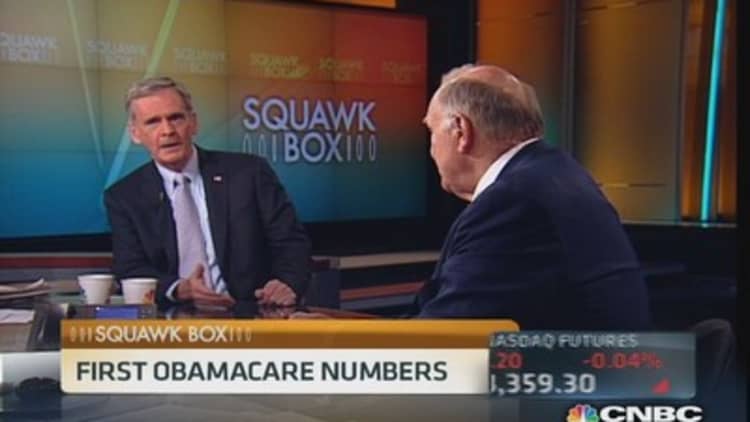
If opponents of Obamacare were to succeed and the president's health-care law collapsed, what would take its place?
Former Gov. Ed Rendell predicted Monday that a system like Medicare for everyone would emerge. "If Republicans and some Democrats who are attacking Obamacare have their way and Obamacare falls off, I think we're looking at single-payer down the road," the Pennsylvania Democrat told CNBC's "Squawk Box."
In a single-payer system, a single entity—usually a government—collects all fees for health care services and pays out all costs.
Also on the show, Republican Judd Gregg claimed a single-payer approach was the plan from the start. "You will have folks moving employees into exchanges, because why should they pay the full cost of insuring employees when they can put the cost on the exchange? And the exchange puts it on the taxpayer," the former New Hampshire senator and governor said.
"Then the exchanges can't function, because they won't be able to be subsidized at that level they have to be subsidized at," he continued. "Then you have the human cry that the only way we can solve this is with a single-payer."
Rendell said he did not support the single-payer approach, but added that if he had designed a system like that, it would be like Medicare. "We can have single-payer plus. A baseline that covers everyone and gives everyone prescription." People also would have the option to "buy up" for more robust coverage, he added.
A single-payer structure would lead to rationing," said Gregg. "You go to Canada, you're chances of getting elective surgery that's significant like hip replacement … you're going to have to wait two or three years. So you come to the United States and have it done." Sticking with the Canada example, Rendell pointed out that Americans turn to pharmacies north of the border to buy cheaper prescription drugs.
On Monday, the state of Kentucky, which runs its own Obamacare exchange, said 40,572 residents have enrolled, including Medicaid and private insurance. The breakdown was 33,561 sign-ups in Medicaid and 7,011 in a qualified health plan since the program began on Oct. 1.
"The state exchanges are so much better," said Rendell, but admitted, "we didn't do enough on cost containment in Obamacare."
Gregg said Obamacare is too broad: "It should have been [just] a catastrophic coverage program."
This week, the Obama administration is scheduled to release October enrollment numbers from the troubled federal health insurance exchange, HealthCare.gov—the portal for 36 states that don't operate their own.
(Read more: )
Health and Human Services Secretary Kathleen Sebelius told the Senate Finance Committee last week the early tally would be "very low," and the data would break out the numbers from the 14 other states and the District of Columbia that run their own marketplaces.
Government officials and outside contractors are working around the clock to fix the tech problems with HealthCare.gov before Dec. 15—the last day for people to sign up for coverage that begins on Jan. 1. The Obama administration has set Nov. 30 as its own deadline for getting everything running smoothly.
—By CNBC's Matthew J. Belvedere. Follow him on Twitter @Matt_SquawkCNBC.


